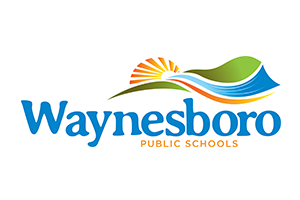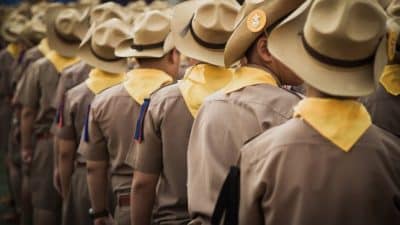By Rebecca J. Barnabi
For Augusta Free Press

At Tuesday’s regular meeting of the Waynesboro School Board, held in Waynesboro High School’s Louis Spilman Auditorium, Waynesboro Schools Superintendent Dr. Jeff Cassell presented a proposed $41,778,853 budget to the school board.
Expected revenue for the next fiscal year is expected to total $41,498,000, including $1.4 million in CARES Act funding.
The school board will have to find ways to cut $280,000 from expenditures to balance the 2021-2022 budget.
Cassell suggested that first the school board must wait to be sure what revenue will come from the federal, state and local levels, then expenditures can be adjusted by reviewing programs and personnel needs.
Providing a 4 percent raise for employees each year for five years is been a goal of the school board in order to compete with nearby school divisions when it comes to recruiting and keeping teachers.
Cassell said that recruiting and keeping teachers is “becoming increasing difficult with a teacher shortage in the state and in the nation.”
Waynesboro Schools can expect a revenue increase of $367,177 from the state, $1,505,548 from the federal government and $1,365,015 from the city of Waynesboro for 2021-2022. The federal funding increase includes the $1.4 million in CARES Act funds.
Based upon an average daily enrollment of 2,800, which determines how much funding public school systems receive, Waynesboro Schools can hope for $20.1 million from the state, $2.7 million from federal and $16.7 million from the city.
Cassell cautioned that the state’s proposed budget will change.
“We’re in an odd place this budget year and an odd place for tonight’s presentation,” Cassell said.
The governor’s proposed budget includes additional funding for the state’s share of one-time bonuses for staff, school counselors, and support of students educationally at-risk and support of English language learners, according to Cassell.
Enrollment loss in the River City will be most apparent when it comes to state funding of Standards of Quality programs and for reducing K-3 primary class sizes.
“Most divisions in Virginia have experienced enrollment loss this year for a variety of reasons,” Cassell said.
During the COVID-19 pandemic, some parents chose to send their children to private schools, enroll them in online programs or home school their children.
“We anticipate that most of those students will return to us when we’re in a lot more normal [learning] model,” Cassell said.
As of September 2020, Waynesboro Schools had an enrollment of 3,111 students in grades pre-K through 12th grade.
“We’re a very diverse school system,” Cassell said, with 51 percent of students identifying as white, 19 percent as Hispanic and 17 percent as black.
While 55 students were considered homeless last year, this year Cassell said 40 students are homeless. He attributes the lower number to the efforts of Waynesboro Area Refuge Ministry and Executive Director Debra Freeman-Belle, who is also a member of Waynesboro School Board.
“So, all in all, I would tell you it’s a good budget, I think,” Cassell said.
He added that he is pleased that, unlike 2020-2021 thanks to the pandemic, the school system will be able to give employee raises, and not have to reduce personnel.










